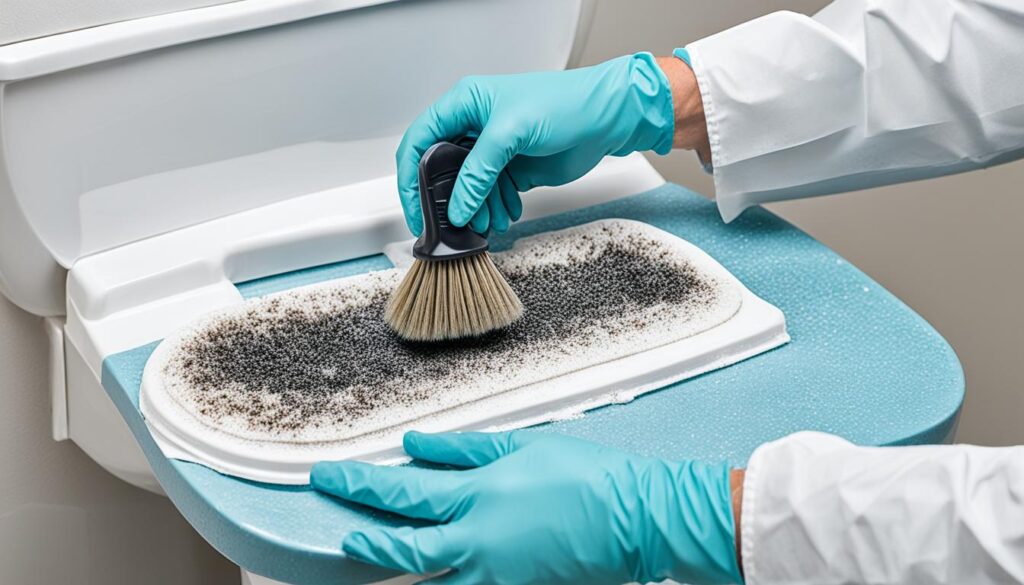
The Complete Guide to pictures of black Mold in toilet tank
The Complete Guide to pictures of black Mold in toilet tank
In this section, we will provide a comprehensive guide on how to visually identify black mold in toilet tanks. Understanding the appearance of black mold is crucial for taking appropriate action against its presence and safeguarding your bathroom environment.
Characteristic Color
One of the key indicators of black mold in toilet tanks is its characteristic dark color. True to its name, black mold typically appears as dark, almost black patches or spots. These patches may spread and cover larger areas if left untreated.
Distinct Texture
Black mold in toilet tanks often exhibits a fuzzy or velvety texture. Upon touching the affected areas, you may notice a soft, almost powdery feel. This texture sets black mold apart from other types of mold that may grow in damp environments.
Growth Patterns
Black mold in toilet tanks tends to grow in colonies or clusters. These clusters may appear as concentrated groups of dark patches, covering various surfaces within the tank. The mold may also spread along the edges, corners, and seams of the tank.
Additionally, black mold can develop a slimy or oily appearance when it comes into contact with water or moisture. This slimy growth can further contribute to the overall unpleasant appearance.
Visually identifying black mold is the first step in addressing its presence in your toilet tank. By recognizing its distinctive color, texture, and growth patterns, you can take prompt action to prevent its spread and protect your bathroom from potential health risks.
Effective Measures to Eliminate Toilet Tank Mold
When it comes to preventing and removing black mold in your toilet tank, taking prompt and effective measures is crucial. Not only does black mold affect the aesthetic appeal of your bathroom, but it also poses potential health risks. In this section, we will discuss practical solutions for black mold removal, toilet tank mold prevention, and mold remediation.
Preventive Measures
Regular cleaning and maintenance are key to preventing mold growth in your toilet tank. Here are some preventive measures you should incorporate into your bathroom cleaning routine:
- Regularly clean your toilet tank using a mixture of bleach and water. This will kill any existing mold spores and prevent further growth.
- Ensure proper ventilation in your bathroom by using exhaust fans or opening windows to reduce moisture levels.
- Check for any leaks in the toilet tank or supply line and repair them promptly.
- Consider using mold-resistant paint on the walls near the toilet tank to create an extra layer of protection.
Methods for Removing Existing Mold
If you notice black mold in your toilet tank, it’s important to take immediate action to remove it. Here are some effective methods for mold removal:
- Use a mold and mildew cleaner specifically designed for bathroom surfaces. Follow the instructions on the product label for best results.
- Scrub the affected area with a brush or sponge to remove the mold. Be sure to wear protective gloves and a mask to prevent exposure to mold spores.
- Rinse the toilet tank thoroughly with clean water to remove any residual mold cleaner and debris.
- Dry the toilet tank completely using a towel or fan. Moisture promotes mold growth, so it’s important to ensure the area is thoroughly dry.
Professional Mold Remediation Services
If the mold infestation in your toilet tank is extensive or you’re unable to remove it effectively on your own, it’s advisable to seek professional mold remediation services. A professional mold remediation company has the expertise, equipment, and knowledge to safely and effectively eliminate black mold from your toilet tank. They will also address the underlying causes of mold growth to prevent future infestations.
| Pros of Professional Mold Remediation Services | Cons of Professional Mold Remediation Services |
|---|---|
| Expertise in identifying and eliminating mold | Costs associated with professional services |
| Use of specialized equipment and techniques | Requires scheduling and coordination |
| Thorough inspection to identify underlying causes of mold growth | Reliance on external service provider |
| Peace of mind knowing the mold has been effectively removed |

In summary, preventing and eliminating black mold in your toilet tank requires a proactive approach. Regular cleaning, maintenance, and prompt mold removal are essential for a mold-free bathroom environment. If you’re unable to address the issue on your own or the mold infestation is severe, don’t hesitate to seek professional mold remediation services.
Conclusion
In conclusion, this article has provided a comprehensive guide to identifying and removing black mold in toilet tanks. By understanding the appearance and growth patterns of black mold, you can take the necessary steps to prevent its formation and address any existing issues.
Regular cleaning and maintenance are crucial in keeping your toilet tank mold-free. Simple measures such as wiping down the surfaces, removing excess moisture, and using mold-resistant products can significantly reduce the risk of mold growth.
However, if you encounter persistent mold problems or suspect extensive contamination, it is recommended to seek professional assistance. Fix Mold Miami, known for their expertise in mold assessment and remediation, can provide the necessary services to ensure a safe and healthy bathroom environment. Contact them at 305-465-6653 for a mold assessment today.




